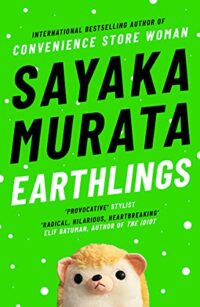Book review: Earthlings by Sayaka Murata

In 2020 when Earthlings by Sayaka Murata came out (in translation from Japanese by Ginny Tapley Takemori) everyone was raving about it. Our local bookshop Storysmith promoted it as one of their bookseller favourites (technically they’re no longer our closest bookshop thanks to the sudden boom in indie bookshops in Bristol, but that’s a topic for another blog post). I was intrigued, and I’d really liked Murata’s previous novel Convenience Store Woman, but I was feeling guilt about how little I was reading (for me) so I put buying new books on hold. Then this summer I fed a friend’s cat while they were on holiday and as a thank you they bought me this. Yay for awesome friends who know the way to my heart.
Like her bestselling previous novel, Murata’s hero in Earthlings is a woman who is emotionally disconnected from the world. But in Natsuki’s case, this may not be due to an innate neurodifference, but rather trauma. Or perhaps a combination.
We meet Natsuki as a child. She believes that her cuddly toy hedgehog Piyyut is an alien from the planet Popinpobopia, a country she first heard of from her beloved cousin Yuu, who she only sees during the summer holidays they spend in the mountains at her grandparents’ home. Yuu claims he is also Popinpobopian and is searching for a spaceship to take him home.
“My town is a factory for the production of human babies. People live in nests packed closely together. It’s just like the silkworm room in Granny’s house. The nests are lined up neatly in rows, and each contains a breeding pair of male and female humans and their babies.”
These conversations initially seem harmless, though perhaps Natsuki has a little too much conviction in this fiction for an 11-year-old. It slowly becomes clear that there is a reason for this imaginary world, that she and Yuu have difficult family situations that are only relieved during their summers together.
This year, even this brief respite is cut short and Natsuki must spend the rest of the holiday attending cram school. The teacher is a grad student admired by everyone except Natsuki, who finds herself the subject of his extra attentions. When she reports his creepy behaviour to a friend and her mother, she is accused of making it up and shunned even more than before.
“I’m sorry. Please don’t throw me out. I’ll listen and obey whatever you say just please don’t throw me out. A child thrown out by adults will die. Please don’t kill me…I must use my magical powers to stay alive. I must become empty. I must obey.”
Natsuki’s story seems to come to a terrible climax a year later, and then the narrative jumps 22 years. She is living comfortably in an asexual marriage, creating a fragile peace with her family. What they don’t know is that she not only still believes in Popinpobopia, but she now shares this belief with her husband and together they strive to avoid the baby-making factory and pretend to be “normal”. But when they take a trip to the mountains, to what was her grandparents’ house, Natsuki’s truths and fictions collide spectacularly.
I won’t deny that I was uncomfortable at several points in this novel. Not only the abuse, but also some of Natsuki’s actions are difficult to read about. It only remains an enjoyable novel as a whole because Murata skilfully uses comedy and surrealism to offset the awful reality. It never feels like she is making light of Natsuki’s suffering. If anything, she is elucidating how someone might survive trauma by dissociating.
It isn’t clear why Natsuki is so badly treated by her family; we can only infer that Natsuki doesn’t behave as she is expected to, she doesn’t conform. This fits with Murata’s theme of society as a factory, where people are cogs who must fit in and play their role day in, day out. To stand out in any way is to break the machinery, so outsiders must be punished. It’s a pretty explicit metaphor, and the novel works well as a satire – one tinged with rage that the world works this way (much of the best humour stems from anger – see also Terry Pratchett).
This really is a heartbreaking book, shining a light on how abuse can be ignored and covered up. It’s genuinely distressing. Once again, Murata has created a character I could completely understand and empathise with, despite the whole novel being about her disconnection from other people.
To date, only Murata’s most recent two novels and one short story collection have been translated into English, but she has published several more books in Japanese. I’m hoping the worldwide success of the newest novels prompts some translations of her previous books.
Chikyu seijin published 2018 by Shinchosha Publishing.
This translation published 2020 by Granta Books.
2 Comments
Comments are closed.